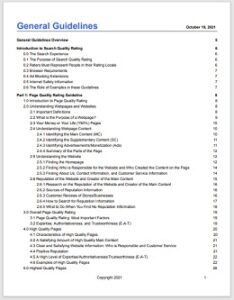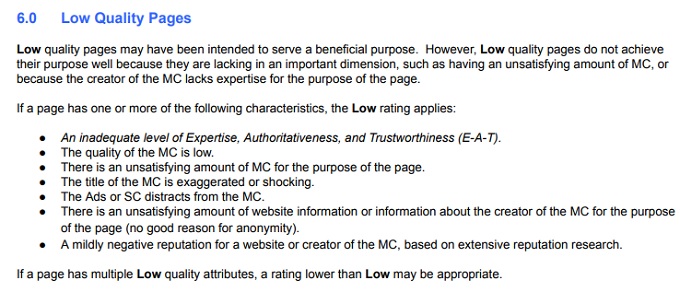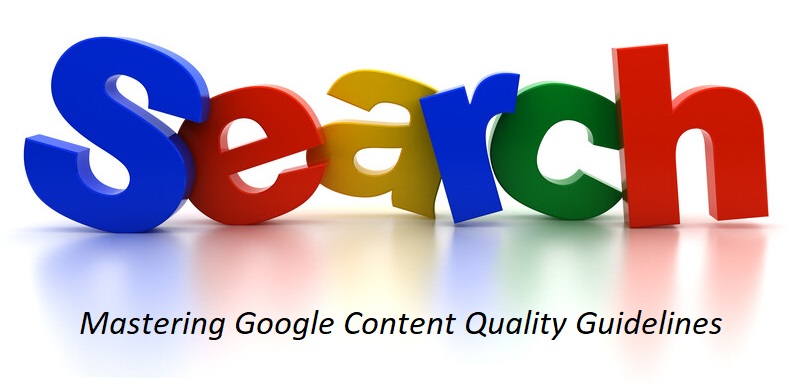How to Improve Against the Google Content Quality Ratings
What is this high-quality content requirement and how do we achieve high quality ratings?
It’s true, Google is making this a priority and it could make business uncomfortable for many content marketers. While emphasis has been on sales conversion (CRO), Google is scrutinizing what happens before. Are you going to get caught in the low quality net?
Today, at SMX, Barry Schwartz of Search Engine Journal interviewed Hyung Jin Kim VP of Engineering in Search from Google. He learned that:
- HJ from Google explained that from an E-A-T standpoint, the template used to evaluate sites & content is done to every single query & result (not just YMYL). They pay particular attention to YMYL queries, but E-A-T is super important to evaluate for all queries.
- HJ explained his team launched the Helpful Content Update (HCU) and they will be extremely transparent about iterations of the HCU (as it evolves). They don’t want to see misleading titles, thin content, buried content, etc. The HCU is geared towards making sure useful content is surfaced.
A template used to evaluate content is not something creative content creators or average small business owners without strategy want to hear. It’s like you need to be genius to figure all of this out including E-A-T, which very few people understand. And genius isn’t all that common.
Poor Backlink Profiles hurt but Your Content Might Sink you Too!
Just when you’re thinking you need more backlinks to prop up your sagging rankings, you might be surprised that links may not be your total issue. The real issue may not be SEO either, or a penalty per se, and advanced SEO by itself may not be able to save you.
It could be your website content simply isn’t good enough, or at least not to Google’s machine-based system and the so-called quality template. Understanding what Google considers premium quality is very important now. Amidst the intense competition for rankings, we’re all learning, and learning means improvement.
And if your competitors have upped their content quality, you will see your site’s rankings slide further against their rising tide. It’s competitive out there.
In this post, we take a look at the quality issue and what Google wants to see in your content. I encourage you to check out the key factors and tips below, and do further reading via the suggested links below.
Please bookmark this post as I’ll update with any insights/tips that come available.
The Matter of Content Quality
 It’s hard to put your pride aside for a moment and reflect on the possibility that overall, your content isn’t meeting Google’s Search Quality Evaluator Guidelines, or your visitors needs. If no one is engaging, complementing, commenting, sharing and linking to your content, it might be a sign that something’s not quite right. Examining the improving your content could be a worthy exercise.
It’s hard to put your pride aside for a moment and reflect on the possibility that overall, your content isn’t meeting Google’s Search Quality Evaluator Guidelines, or your visitors needs. If no one is engaging, complementing, commenting, sharing and linking to your content, it might be a sign that something’s not quite right. Examining the improving your content could be a worthy exercise.
Aside from achieving a high quality rating, we must also avoid having our web content tagged as low quality — which is more like an automated penalty.
Google walks a dangerous censorship issue as you’ll see, when it insists some bloggers and publishers don’t have the credibility to speak intelligently and authoritatively about a topic unless they possess specific educational or professional credentials (plus backlinks from big industry sites which are closed shops). For instance, the guidelines specify that information must “must be supported by expert consensus” which erases other opinions and perspectives on the topic. This has become an ever-narrowing channel of ultimate authority.
In no way do I support their insistence in so called authority sites, including corporations and politically-biased media sites which now dominate the top of search results.
“For some topics, such as humor or recipes, less formal expertise is OK.” Well actually, we don’t care about expertise in humor, we just want to hear/see and experience something funny. Jim Carrey doesn’t have a doctorate in humor yet he is the funniest, most watched comedian of all time.
The ranking guidelines definitely are a matter for US senate investigators to investigate in a anti-free speech indictment in 2023. Until then, we must obey Google’s rules for content quality rating, and just use them to improve our sites.
Google’s Content Quality Criteria
Google states in its Guidelines on the Google developers site from Danny Sullivan, Public Liaison for Search at Google, suggested that it may take some time to recover, if ever from a low quality rating. Truth is, we can improve and regain our rankings.
“We will consider content to be Low quality if it is created without adequate time, effort, expertise, or talent/skill. Pages with low quality MC do not achieve their purpose well. — from Google Search Quality Evaluators Guidelines.

However, even if your site as whole receives this type of automated penalty, to drop your overall rankings and traffic, Google states that you can still have specific pages that will rank well.
“Google’s Search Quality Rating Guidelines (PDF) is a 157 page document that was created to guide human quality raters who were assigned a list of sites to rate. The guidelines gives insights into how Google defines what a a high quality site is. Hidden within that document, written between the lines as it were, are five important insights into the kinds of sites Google aspires to rank” — from Roger Montti in the Search Engine Journal
Consider that the author of the piece is part of the content credibility equation too — promote their expertise, connections, and content.
“When Google looks at the credibility of a website, it’s looking to see whether or not the writer of the article—or any content on the page—has a reputation in the field that they are writing about. This method ensures the content can be trusted.” from metricmarketing.com.
Expertise, Authoritativeness, and Trustworthiness
Google’s had big difficulties establishing credibility of content. They developed the E-A-T formula which attempts to evaluate the Expertise, Authoritativeness, and Trustworthiness of the author. But that basic task is just part of the content quality algorithm. It’s important for you or your SEO and copywriters to go over the guidelines to understand precisely what Google’s wants to see and not see.
Google is constantly updating it’s rater guidelines and you will see how their agenda reflects liberal social agendas and facts they believe should not be disputed. It’s very controversial, but you have no power up against a monopoly of Google’s stature. Even if your content is excellent and engaging, they can crush your traffic.
This flattening of your traffic can happen at anytime, and usually shows up during a major core update.
Here are some key items in Google’s quality rating algorithm:
- original research, reporting or insights
- thorough, comprehensive treatment of a keyword topic or theme
- clear referencing of information sources and supporting thoughts and expert authorship
- well-presented, organized, and free of jargon, hype and rants
- free of spelling errors and sloppy grammar
- simple, accessible topic navigation
- minimal technical errors (core metrics of speed, mobile friendliness, and coding errors)
Redeveloping Your Content
Google’s algorithm might be more disenchanted with you the author or your company rather than just a single piece of content. If your content contains political views Google doesn’t like, or has strong, negative tones, hate speech, or you deny facts they say are universally true, then your site could be in for a rough ride.
Basically, they take your PageRank away, and you’ll get pushed down into the 3rd to 10th pages of results and your traffic from keyword long tail phrases will be severely diminished.
If Google dislikes one of your pages strongly, it will tend not to show up well at all. You’ll struggle to get that page respected, as Google holds these grudges. You may want to move onto developing another page while deleting or redirecting that page.
If Google swaps out one of your pages for another, strangely, it means they don’t like your target page. Sure over-optimization can be an issue, but that plays into the low quality criteria. If you choose to rewrite that piece, it has to be re-engineered thoughtfully. Don’t just write another post and publish. With the penalty or downgrade, they don’t trust you or your content, so you must develop something excellent this time and be free of negative signals.
If your agency is pumping out content on schedule, it’s time to ask them to cut back and forget about quantity and timing, and refocus solely on quality. This automated content quality rating algorithm is a significant persistent threat to bloggers and publishers. Let’s find out now how to re-engineer for high quality ratings.
21 Great Ways to Produce Outstanding Content Quality
- research topics thoroughly and dig into valid, popularly cited research
- be more conscious of the specific value of the content to users and satisfying the user journey (write them down so they’re top of mind)
- change your copy voice and style of expression (avoid touchy topics, keywords and hyped topics)
- user intent: visualize your visitor’s experience on your site and improve the content flow
- use advanced SEO software to establish keyword themes of top quality sites on those keywords
- curate material, names, urls, quotes etc. from domains that have strong domain authority (government, industry portals, universities, research labs, media, etc.)
- include unique material that other sites don’t cover which supports important points you’re making
- link out to highly relevant and cited sources (but not your competitor’s sites or the sites that link to them)
- present material key topic by key topic, in order of importance so it’s easily comprehensible (consider writing solely for your best targeted prospects, to avoid confusion and dilution)
- ensure the narrative, topic flow are enjoyable, exciting, and encourage more clicking
- add excellent graphics, video, charts, lists that make it more interesting to experience
- use appropriately worded title tags and headings that grab attention but don’t overdo keywords in them
- have good depth/length in your content (1000+ words) but ensure it still loads quickly
- keep paragraphs short and understandable
- ensure your core metrics on your page and your site are optimal (Google Search Console)
- work hard to create backlinks from high domain authority and topically relevant websites
- ensure you have a link to the author’s profile page, and an address/business profile to link to (Google business, Yelp, top business directories)
- strengthen/promote the authoritativeness, credibility and positive reputation of the author
- make sure each of your pages has a unique and coordinated purpose
- spend a lot of time editing and improving the flow and focal point of the content piece
- promote strongly so journalists, reports, your industry connections, and bloggers get your message
Studying the top sites that rank on Google will give you less insight than looking for the small publishers/companies that rank down in the 11th to 40th positions. Top rankings sites are usually big corporations who have poor content.
However, those sites have the credibility that comes from big business, big money promotion.
As a small to medium sized, business there are still opportunities to do well on Google search. Hire a talented advanced SEO consultant with deep skills in content research, topic expertise, and keyword understanding to make it possible. Your site will resonate fully with the highest quality possible.
Additional Quality Guideline Resources
- searchenginejournal.com/google-eat/quality-raters-guidelines/
- ahrefs.com/blog/google-quality-raters-guidelines/
- static.googleusercontent.com/media/guidelines.raterhub.com/en//searchqualityevaluatorguidelines.pdf
- metricmarketing.com/blog/the-5-latest-updates-to-googles-search-quality-rating-guidelines/
High Rankings | Advanced SEO Strategy | SEO Software | Hotel SEO | Travel SEO | San Diego SEO Company | Boston SEO Company | Linkedin SEO | About Gord Collins | Gord Collins Facebook | Content Strategy | SEO Company







